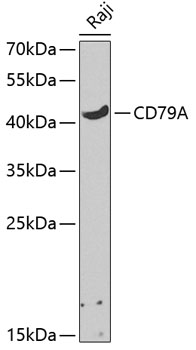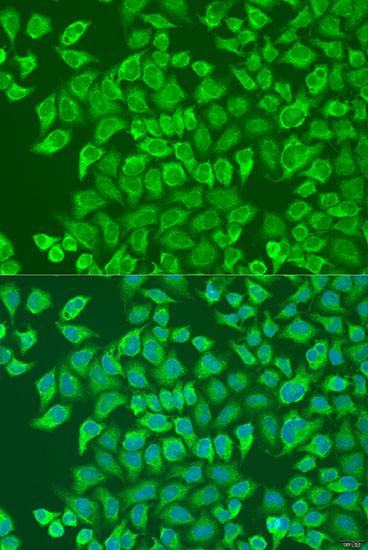-
Product Name
CD79A Polyclonal Antibody
- Documents
-
Description
Polyclonal antibody to CD79A
-
Tested applications
WB, IF
-
Species reactivity
Human
-
Alternative names
CD79A antibody; IGA antibody; MB-1 antibody; CD79a molecule antibody
-
Isotype
Rabbit IgG
-
Preparation
Antigen: Recombinant fusion protein containing a sequence corresponding to amino acids 33-145 of human CD79A (NP_001774.1).
-
Clonality
Polyclonal
-
Formulation
PBS with 0.02% sodium azide, 50% glycerol, pH7.3.
-
Storage instructions
Store at -20℃. Avoid freeze / thaw cycles.
-
Applications
WB 1:500 - 1:1000
IF 1:50 - 1:100 -
Validations

Western blot - CD79A Polyclonal Antibody
Western blot analysis of extracts of Raji cells, using CD79A antibody at 1:1000 dilution.Secondary antibody: HRP Goat Anti-Rabbit IgG (H+L) at 1:10000 dilution.Lysates/proteins: 25ug per lane.Blocking buffer: 3% nonfat dry milk in TBST.Detection: ECL Enhanced Kit .Exposure time: 90s.

Immunofluorescence - CD79A Polyclonal Antibody
Immunofluorescence analysis of U2OS cells using CD79A antibody at dilution of 1:100. Blue: DAPI for nuclear staining.
-
Background
Required in cooperation with CD79B for initiation of the signal transduction cascade activated by binding of antigen to the B-cell antigen receptor complex (BCR) which leads to internalization of the complex, trafficking to late endosomes and antigen presentation. Also required for BCR surface expression and for efficient differentiation of pro- and pre-B-cells. Stimulates SYK autophosphorylation and activation. Binds to BLNK, bringing BLNK into proximity with SYK and allowing SYK to phosphorylate BLNK. Also interacts with and increases activity of some Src-family tyrosine kinases. Represses BCR signaling during development of immature B-cells.
Related Products / Services
Please note: All products are "FOR RESEARCH USE ONLY AND ARE NOT INTENDED FOR DIAGNOSTIC OR THERAPEUTIC USE"
